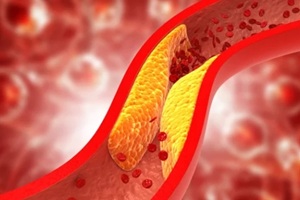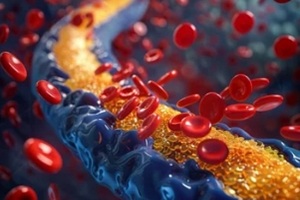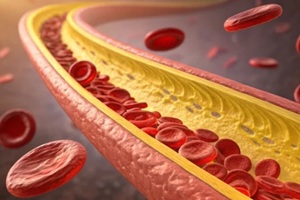 High cholesterol, also referred to as hypercholesterolemia, is a significant but controllable risk factor for heart disease. Heart disease is the leading cause of death worldwide. Getting your cholesterol levels checked through a simple cholesterol screening could save your life by detecting high cholesterol early, allowing for lifestyle changes and treatment to prevent heart disease.
High cholesterol, also referred to as hypercholesterolemia, is a significant but controllable risk factor for heart disease. Heart disease is the leading cause of death worldwide. Getting your cholesterol levels checked through a simple cholesterol screening could save your life by detecting high cholesterol early, allowing for lifestyle changes and treatment to prevent heart disease.
What Is Cholesterol?
Cholesterol is a waxy substance similar to fat that is found in all the body’s cells and blood plasma. The body uses cholesterol to build healthy cells, but high levels can spike the risk of heart disease.
The two main types:
- LDL cholesterol: LDL cholesterol is dubbed “bad cholesterol”; it builds up on artery walls and causes blockages.
- HDL cholesterol: HDL cholesterol is considered “good cholesterol”; it transfers LDL cholesterol back to the liver, where it is eliminated from the body.
Dangers of High Cholesterol
When too much LDL cholesterol travels through the blood, it can slowly accumulate in the inner walls of the arteries that supply blood flow to the heart and other areas of the body. This plaque buildup causes atherosclerosis, the underlying disease that is to blame for most heart attacks and strokes.
Atherosclerosis can cause dangerous blockages anywhere in the body, but plaque buildup in the arteries surrounding the heart leads to coronary artery disease and significantly raises the risk of having a heart attack.
Alarmingly, high cholesterol does not produce obvious symptoms. Some people have high total cholesterol and LDL or low HDL levels for years without knowing it or experiencing signs of heart disease. Some people are unaware of their condition until they have a heart attack or stroke. This makes getting a cholesterol test paramount.
Early Detection Through Cholesterol Screenings
A cholesterol screening is a simple, quick blood test that measures levels of total cholesterol, LDL cholesterol, HDL cholesterol, and triglycerides (blood fats). Knowing these numbers is necessary for determining heart disease risk and making lifestyle changes in time to prevent complications.
Doctors may recommend cholesterol screenings start earlier and occur more frequently for patients with high cholesterol risk factors, such as family history, obesity, diabetes, high blood pressure, smoking, or age. However, for most adults over 20, the American Heart Association advises getting a cholesterol screening at least once every four to six years.
After age 40, doctors also calculate a percentage estimating the risk of having a heart attack or stroke within the next ten years based on cholesterol levels combined with other risk factors. Those with over 20% risk qualify for cholesterol-lowering medication.
 For the most accurate cholesterol test results, carefully follow your provider’s instructions, which typically involve fasting and refraining from strenuous physical exertion immediately before the test. Then, be sure to receive screenings as often as your doctor recommends, as early detection and control of high cholesterol can save lives.
For the most accurate cholesterol test results, carefully follow your provider’s instructions, which typically involve fasting and refraining from strenuous physical exertion immediately before the test. Then, be sure to receive screenings as often as your doctor recommends, as early detection and control of high cholesterol can save lives.
Essential Window for Early Intervention
Research shows that both men and women with elevated cholesterol in young adulthood face the highest lifetime risk of eventually developing cardiovascular disease compared to those with ideal cholesterol levels.
Yet studies also prove that lowering LDL cholesterol levels through diet, exercise, and medication use (if levels remain dangerously high) can significantly reduce the chances of having a heart attack or stroke, no matter your age.
Detecting and controlling high cholesterol early, even in young adulthood, allows cholesterol levels to be properly managed during this important window, where early intervention provides enormous heart health benefits down the road.
Lifestyle Changes That Reduce Cholesterol
Simple daily choices to lower cholesterol include:
- Increasing physical activity with regular aerobic exercise
- Maintaining a healthy body weight
- Eating more vegetables, fruits, and whole grains
- Consuming foods rich in omega-3 fatty acids, such as fish and nuts
- Limiting red meat intake
- Avoiding fried foods and those with trans fats
- Quitting smoking and limiting alcohol
- Managing stress levels with relaxing activities
Medication If Needed
Cholesterol-lowering medication may be necessary for those with hereditary high cholesterol or who struggle to reach healthy levels through lifestyle alone. Statins are the most common form of medication used to treat high cholesterol. They work by reducing LDL cholesterol production in the liver. Other options help eliminate LDL cholesterol from your bloodstream.
Doctors may prescribe cholesterol medications for patients with exceptionally high LDL cholesterol or those unable to control levels through dietary changes and exercise alone. These drugs often successfully lower cholesterol when natural methods fail.
The Difference Early Detection Makes
Early detection of high cholesterol allows lifestyle interventions and medication to lower levels before irreversible arterial plaque damage happens. Studies prove that detecting and controlling high cholesterol in young adulthood provides the greatest odds of dodging heart disease later on, highlighting why early routine screenings are imperative.
Getting just one cholesterol test could uncover a hidden health issue that, if unaddressed, will dramatically increase the risk of heart disease throughout one’s life. However, that discovery also offers the power to make informed changes to prevent disease and extend life.
Rely on Imperial Center Family Medicine for Your Cholesterol Screening
 Similar to many silent health conditions detectable only through medical tests, high cholesterol rarely displays symptoms until reaching advanced stages when health complications occur. Routine, early cholesterol checks can expose stealthy high cholesterol before plaque formation damages arteries. This early detection allows you to make lifestyle changes that make a substantial difference.
Similar to many silent health conditions detectable only through medical tests, high cholesterol rarely displays symptoms until reaching advanced stages when health complications occur. Routine, early cholesterol checks can expose stealthy high cholesterol before plaque formation damages arteries. This early detection allows you to make lifestyle changes that make a substantial difference.
Imperial Center Family Medicine’s healthcare providers care for your overall health, from body and mind to spirit. Our holistic approach considers both risk factors and lifestyle habits when developing individualized treatment plans. Contact us today at 919-873-4437 or online for your cholesterol screening and to develop a holistic plan to boost your cardiac health.
